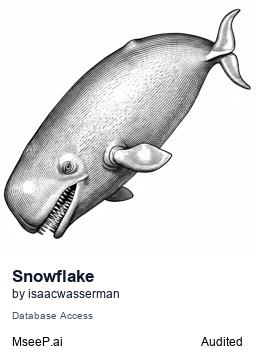Snowflake MCP Server
Enables interaction with Snowflake databases through SQL queries, schema exploration, and data analysis. Supports read/write operations, table management, and automatic insight tracking for comprehensive database operations through natural language.
README
Snowflake MCP Server
Overview
A Model Context Protocol (MCP) server implementation that provides database interaction with Snowflake. This server enables running SQL queries via tools and exposes data insights and schema context as resources.
Components
Resources
-
memo://insights
A continuously updated memo aggregating discovered data insights.
Updated automatically when new insights are appended via theappend_insighttool. -
context://table/{table_name}
(If prefetch enabled) Per-table schema summaries, including columns and comments, exposed as individual resources.
Tools
The server exposes the following tools:
Query Tools
-
read_query
ExecuteSELECTqueries to read data from the database.
Input:query(string): TheSELECTSQL query to execute
Returns: Query results as array of objects
-
write_query(enabled only with--allow-write)
ExecuteINSERT,UPDATE, orDELETEqueries.
Input:query(string): The SQL modification query
Returns: Number of affected rows or confirmation
-
create_table(enabled only with--allow-write)
Create new tables in the database.
Input:query(string):CREATE TABLESQL statement
Returns: Confirmation of table creation
Schema Tools
-
list_databases
List all databases in the Snowflake instance.
Returns: Array of database names -
list_schemas
List all schemas within a specific database.
Input:database(string): Name of the database
Returns: Array of schema names
-
list_tables
List all tables within a specific database and schema.
Input:database(string): Name of the databaseschema(string): Name of the schema
Returns: Array of table metadata
-
describe_table
View column information for a specific table.
Input:table_name(string): Fully qualified table name (database.schema.table)
Returns: Array of column definitions with names, types, nullability, defaults, and comments
Analysis Tools
append_insight
Add new data insights to the memo resource.
Input:insight(string): Data insight discovered from analysis
Returns: Confirmation of insight addition
Effect: Triggers update ofmemo://insightsresource
Usage with Claude Desktop
Installing via Smithery
To install Snowflake Server for Claude Desktop automatically via Smithery:
npx -y @smithery/cli install mcp_snowflake_server --client claude
Installing via UVX
"mcpServers": {
"snowflake_pip": {
"command": "uvx",
"args": [
"--python=3.12", // Optional: specify Python version <=3.12
"mcp_snowflake_server",
"--account", "your_account",
"--warehouse", "your_warehouse",
"--user", "your_user",
"--password", "your_password",
"--role", "your_role",
"--database", "your_database",
"--schema", "your_schema"
// Optionally: "--allow_write"
// Optionally: "--log_dir", "/absolute/path/to/logs"
// Optionally: "--log_level", "DEBUG"/"INFO"/"WARNING"/"ERROR"/"CRITICAL"
// Optionally: "--exclude_tools", "{tool_name}", ["{other_tool_name}"]
]
}
}
Installing Locally
-
Install Claude AI Desktop App
-
Install
uv:
curl -LsSf https://astral.sh/uv/install.sh | sh
- Create a
.envfile with your Snowflake credentials:
SNOWFLAKE_USER="xxx@your_email.com"
SNOWFLAKE_ACCOUNT="xxx"
SNOWFLAKE_ROLE="xxx"
SNOWFLAKE_DATABASE="xxx"
SNOWFLAKE_SCHEMA="xxx"
SNOWFLAKE_WAREHOUSE="xxx"
SNOWFLAKE_PASSWORD="xxx"
# Alternatively, use external browser authentication:
# SNOWFLAKE_AUTHENTICATOR="externalbrowser"
-
[Optional] Modify
runtime_config.jsonto set exclusion patterns for databases, schemas, or tables. -
Test locally:
uv --directory /absolute/path/to/mcp_snowflake_server run mcp_snowflake_server
- Add the server to your
claude_desktop_config.json:
"mcpServers": {
"snowflake_local": {
"command": "/absolute/path/to/uv",
"args": [
"--python=3.12", // Optional
"--directory", "/absolute/path/to/mcp_snowflake_server",
"run", "mcp_snowflake_server"
// Optionally: "--allow_write"
// Optionally: "--log_dir", "/absolute/path/to/logs"
// Optionally: "--log_level", "DEBUG"/"INFO"/"WARNING"/"ERROR"/"CRITICAL"
// Optionally: "--exclude_tools", "{tool_name}", ["{other_tool_name}"]
]
}
}
Notes
- By default, write operations are disabled. Enable them explicitly with
--allow-write. - The server supports filtering out specific databases, schemas, or tables via exclusion patterns.
- The server exposes additional per-table context resources if prefetching is enabled.
- The
append_insighttool updates thememo://insightsresource dynamically.
License
MIT
Recommended Servers
playwright-mcp
A Model Context Protocol server that enables LLMs to interact with web pages through structured accessibility snapshots without requiring vision models or screenshots.
Audiense Insights MCP Server
Enables interaction with Audiense Insights accounts via the Model Context Protocol, facilitating the extraction and analysis of marketing insights and audience data including demographics, behavior, and influencer engagement.
Magic Component Platform (MCP)
An AI-powered tool that generates modern UI components from natural language descriptions, integrating with popular IDEs to streamline UI development workflow.
VeyraX MCP
Single MCP tool to connect all your favorite tools: Gmail, Calendar and 40 more.
Kagi MCP Server
An MCP server that integrates Kagi search capabilities with Claude AI, enabling Claude to perform real-time web searches when answering questions that require up-to-date information.
graphlit-mcp-server
The Model Context Protocol (MCP) Server enables integration between MCP clients and the Graphlit service. Ingest anything from Slack to Gmail to podcast feeds, in addition to web crawling, into a Graphlit project - and then retrieve relevant contents from the MCP client.
Qdrant Server
This repository is an example of how to create a MCP server for Qdrant, a vector search engine.
Neon Database
MCP server for interacting with Neon Management API and databases
Exa Search
A Model Context Protocol (MCP) server lets AI assistants like Claude use the Exa AI Search API for web searches. This setup allows AI models to get real-time web information in a safe and controlled way.
E2B
Using MCP to run code via e2b.

